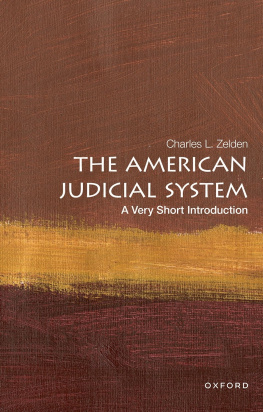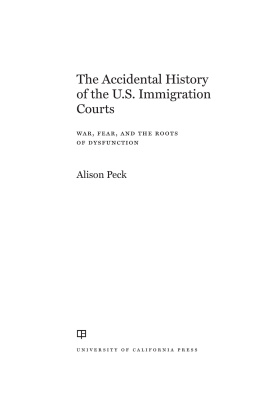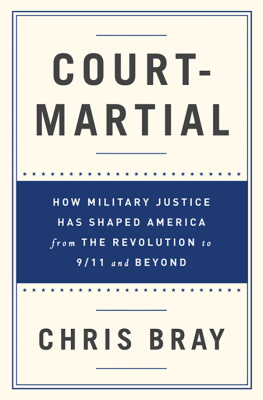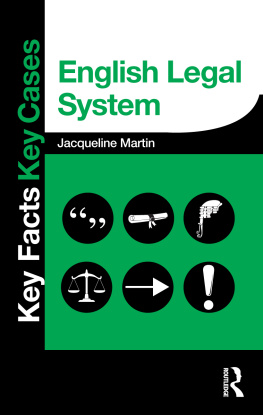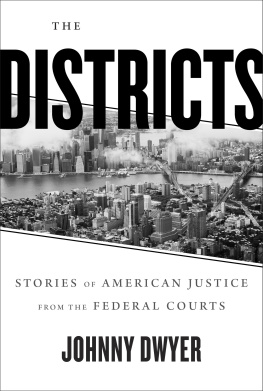
Praise for Rebuilding Justice
Civil justice in America has serious problems, as Rebecca Love Kourlis and Dirk Olin vividly describe in Rebuilding Justice . This important book exposes unseemly judicial elections, the use of discovery as a weapon for extortion, and other distortions of justice. Kourlis and Olin also provide practical solutions that are certain to be influential in the inevitable battle to realign civil justice with the needs of a free society.
Philip K. Howard, Wall Street lawyer and best-selling author of The Death of Common Sense and The Collapse of the Common Good
This book couldnt have come at a more opportune moment. The American civil justice system is brokenjury service is in decline, the role of the judge has become bitterly politicized, the length and expense of civil litigation has made it prohibitive, and courts could not be less user-friendly if they tried. Rebuilding Justice offers a clear-eyed diagnosis of the breakdown of civil courts and jury trials and a lofty reminder of why our Constitution is alone in protecting access to them. This is a clarion call to repair the national treasure that is our civil courts system and a bracing lesson in whats at stake if we dont.
Dahlia Lithwick, senior editor at Slate , contributing editor at Newsweek , and former guest columnist for the New York Times
Court reform is the crucial third leg of judicial reform to go along with judicial election and recusal reform. As someone who has personal experience in a protracted and ongoing legal battle, it has become apparent to me that real judicial reform cannot be attained without all three. Whether you have been in court or not; whether you are a business person or a private citizen, the issues presented in this book should be of front-burner importance to you.
Hugh Caperton, West Virginia businessman, plaintiff in Caperton v. Massey Energy
This thought-provoking book should be required reading for all Americans. Our justice system is admired around the world, but, sadly, the state courts across this country are slowly failing. Change and resources are desperately needed. Unless we act and act soon, meaningful, timely, and affordable access to justicethe bedrock promise of the American constitutional experiencewill cease to be real. We have no time to waste.
John T. Broderick Jr., former chief justice of the New Hampshire Supreme Court and current dean of the University of New Hampshire School of Law
This is an important book. It describes a crisis in our civil justice system that is not just brewing, but already fully brewed. And while others have written about many of these problems before, no one has drawn them together in so readable a form or sounded this clear and urgent a clarion call. Not everyone will agree with all the proposed solutions, but all are worth close consideration, and taken together they provide much food for thoughtand action.
Larry D. Kramer, dean, Stanford Law School

2011 by Institute for the Advancement of the American Legal System, and Dirk Olin
All rights reserved. No part of this book may be reproduced or transmitted in any form or by any means, electronic or mechanical, including photocopying, recording, or by an information storage and retrieval systemexcept by a reviewer who may quote brief passages in a reviewwithout permission in writing from the publisher.
Library of Congress Cataloging-in-Publication Data
Kourlis, Rebecca Love.
Rebuilding justice : civil courts in jeopardy and why you should care
/ Rebecca Love Kourlis, Dirk Olin.
p. cm.
Includes bibliographical references and index.
ISBN 978-1-55591-538-4 (pbk.)
1. Justice, Administration of--United States. I. Olin, Dirk. II.
Title.
KF8700.K68 2011
347.73--dc23
2011029469
Printed on recycled paper in the United States of America
0 9 8 7 6 5 4 3 2 1
Design by Jack Lenzo
Cover image Paul Kooi | iStockphoto
Fulcrum Publishing
4690 Table Mountain Dr., Ste. 100
Golden, CO 80403
800-992-2908 303-277-1623
www.fulcrumbooks.com
Table of Contents
Foreword
O ur countrys courts are in danger. Our democratic society depends upon the existence of a qualified and independent third branch of government. A healthy, fully functioning judiciary provides the counterbalance to the political branches that is necessary to assure protection of our constitutional rights. But support for judicial independence has faltered, in large part because our education system is failing to impart an understanding of the role and importance of the courts. We must rebuild public support for maintaining and protecting the courts.
This book is an effort to contribute to that project. I applaud its contribution to the general level of knowledge about the courtsfor lawyers and nonlawyers alike. And I commend its observations about developing judicial selection systems that take cash out of the judicial selection process and that provide objective judicial evaluation tools to assure accountability.
We are blessed with many excellent judges and court staff around the country, in both the federal and state systems. But they and all the rest of us have an obligation to work hard to improve the system so that it is both impartial and accountable and so that it provides just and efficient resolution of cases. It is a duty that falls to all citizens, not just to judges and lawyers. This book should be of interest to individuals committed specifically to the health of the courts and, more broadly, to the health of our democratic system.
former Supreme Court Justice Sandra Day OConnor
Preface
W e gratefully acknowledge the invaluable assistance of Natalie Knowlton, research analyst with the Institute for the Advancement of the American Legal System (IAALS). Natalie helped us to synthesize our two voices into one; provided research and the benefit of her own work and knowledge on these various subjects; organized and checked our work; and generally made the train run on time. We thank you, Natalie. We offer our thanks as well to Jordan Singer, assistant professor of law at the New England School of Law, and Betsy Morris, former writer and editor with Fortune magazine and the Wall Street Journal . Jordy was involved in the early fashioning of this book and Betsy in the refashioning and reorganizing.
We further acknowledge those attorneys, judges, court administrators, and other participants in the system who lent their insights and voices to this effort.
Finally, we would like to thank the individuals, committees, and organizations with whom IAALS works. Without your input, support, constructive criticism, and creative optimism, this bookand the broader efforts to which IAALS is dedicatedwould not be possible. Thank you.
Introduction
T his book is an effort to sound the clarion call about the crisis in the courts in twenty-first-century America. Its purpose is to illuminate why courts are critical and how they are being eroded, defaced, and underminedand to present some solutions, both internal and external. Rebuilding Justice is a joint product of two authors: one a former trial judge and state court justice who has seen the system from the inside for thirty years, and the other a legal affairs journalist who has made a career of following and commenting on the system from the outside. We hope that, between the two of us, we provide a balanced perspective.
Our stories differ, so we will begin them separately.
Next page

